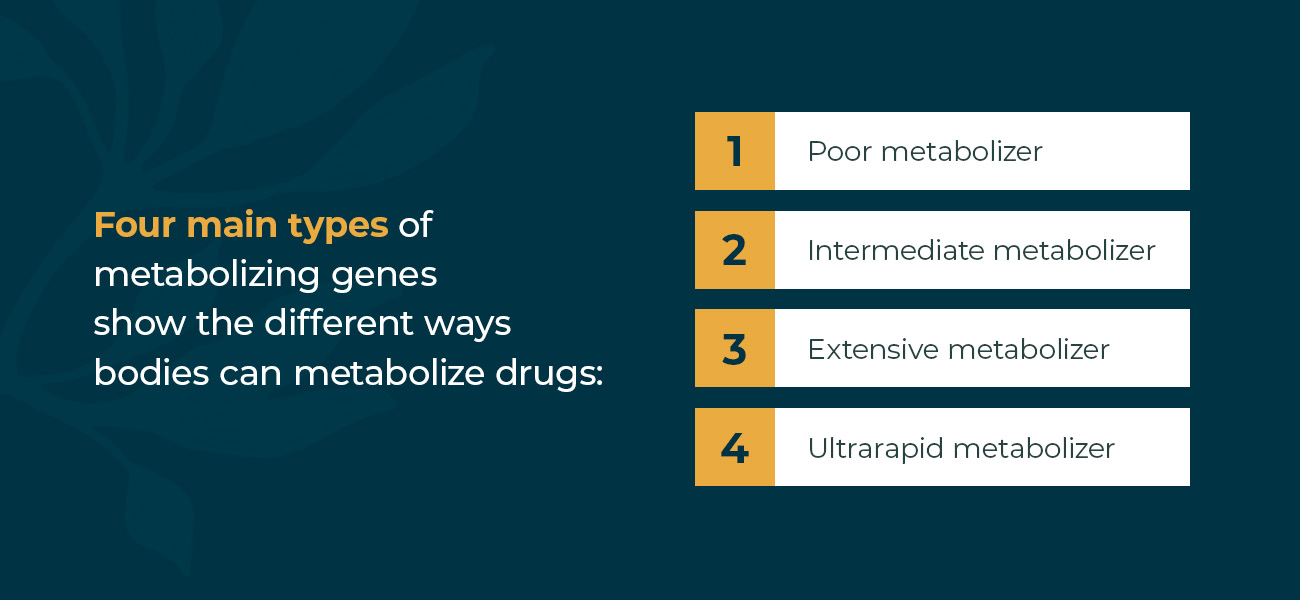
The effects of drugs vary from person to person. Two people can take the same amount of a substance and feel different results. Do you ever wonder why people have unique responses to drugs or why some people have a higher chance of getting addicted than others? Multiple factors come into play. Below are seven reasons why drugs affect everyone differently.
Learn About Outpatient Treatment
Someone who takes a drug on a regular basis can build a tolerance. When this happens, they feel fewer effects from the drug over time. The body adapts to its presence and needs a higher amount for the person to feel the same results. Taking certain drugs can cause you to develop a tolerance at a faster rate than others. For example, the way opioids interact with the body creates a tolerance in a short time. Opioid tolerances can build after as little as two or three doses, meaning someone taking an opioid for the first time could have a very different experience from someone who has taken opioids multiple times, even if they receive the same dose.
A person's size and amount of fat and muscle impact their reaction to a drug. Larger people also have larger vascular systems, meaning that a substance must travel in more blood. The higher volume of blood dilutes the drug, so its effects aren't as strong.
There are also fat-soluble drugs that stay in the system for a long time when the person has a high amount of fat tissue. For this reason, the effects are less pronounced. For example, fat-soluble medications are common for those with obesity and conditions like depression, hypertension or schizophrenia. However, the altered metabolism makes it more likely that people with obesity will receive an over or under-diagnosis. In the case of diazepam, research showed a delay in achieving the drug's effect in those with obesity, and it persisted in their bodies for longer periods. Meanwhile, non-fat-soluble substances focus on muscle mass and have a stronger impact on those with less muscle.
As someone gets older, they need less of a drug to feel its effects. They develop more fat tissue in relation to muscle, so a drug lasts for a long time. The liver reduces in size and effectiveness over the years as well, so its capacity to absorb and filter various drugs decreases. The circulatory system also often slows down in older people, impacting how quickly drugs reach the liver and kidneys. Drugs can also worsen conditions for older adults and pose greater health risks and longer recovery times compared to younger adults. Older adults are also more likely to have more prescription medications as health conditions develop. This increased exposure leads to higher exposure rates of potentially addictive medications.
Most people have hormones and body sizes dependent on their biological sex. Men tend to have bigger body sizes and lower fat tissue proportions than women, so various drugs affect them in different ways. Men also have higher rates of substance dependence and use than women.
For women, even different phases of the menstrual cycle can change someone's sensitivity to certain drugs. For example, certain phases can cause a stronger reaction to stimulant drugs than others. Hormonal changes can influence drug metabolism, absorption, execration and distribution, leading to different effects. Women also metabolize nicotine faster than men, giving them a different experience with these substances.
Gender differences can prompt different drug responses. In the case of smoking, women are more susceptible to sensory and social stimuli than men. This can lead to a greater sensitivity for visual cues as triggers.

Someone's genetic makeup influences the way they absorb drugs. Genes determine the activity of the enzymes in the liver that help the body metabolize drugs. Most gene differences create small changes, but some types of genetic coding prevent the enzymes from working. In some cases, genes cause someone to process drugs at a rapid rate, creating an unpleasant response.
Whether a drug is in an active or inactive form can impact how a person responds to it as well. Drugs in an active form have an immediate impact on the body. Liver enzymes break down the drug to make it inactive. If the enzyme responsible for breaking the drug down does not work correctly, the body cannot effectively get rid of the drug. This can cause the body to have too much of the drug, leading to serious side effects.
Alternatively, inactive drugs require enzymes to break them down into their active form. If the enzymes are unable to break the drug down, the body will not experience the desired effects of the drug. For this reason, some drugs may not be effective for some people, or they may require different doses.
Four main types of metabolizing genes show the different ways bodies can metabolize drugs:
Learn More About Substance Abuse
The environment in which someone grew up can significantly affect the likelihood of drug addiction. Addiction is typically linked to a learned behavior in a certain environment where the person acquires knowledge of the substance and how to use it. Addiction all boils down to the physical, emotional and social aspects of a home, school, work environment and more.
A stressful and abusive early home environment for a child can drive them toward substances for a source of comfort — especially if their home includes exposure to these substances. If someone learns that using drugs and alcohol is a normal behavior or acceptable coping mechanism, they will also choose a similar behavior in their life. This concept is also true for learned behaviors from those they surround themself with, like friends and acquaintances and what those individuals deem acceptable. Environmental factors often tie into other considerations on this list. For example, someone who uses drugs often with their friends may build a high tolerance.
People with trauma or who experience high-stress situations can undergo physical changes in their brains. Brain structure abnormalities can lead to issues with behavior and cognition, and stress hormones can impact brain development. These changes and a person's desire to repress memories or “escape” can lead to very different experiences with drugs than other people.
Existing health conditions can create a higher risk of addiction, even though it is not always the health condition itself — it is usually the treatment. In 1995, the FDA believed OxyContin could result in less abuse potential and introduced the drug as a less-addictive opioid pill to treat chronic pain — though this was not the truth. Over the next two decades, doctors prescribed this medication, not knowing its addictive properties. The opioid crisis has provided awareness of how even prescription drugs must be taken cautiously.
The possibility of addiction also goes for mental health conditions like depression, anxiety, PTSD and more. Many times, those with a substance abuse disorder also have a mental disorder. If a person is taking a prescription medication and uses another substance on top of it intentionally or unintentionally, they could experience vastly different effects from someone only taking the second substance. This combination is never safe and can have unpredictable and even deadly outcomes.
Some medications contain ingredients that can lead to addiction if a person misuses them. For example, anti-anxiety medicines, stimulants like Ritalin and Adderall, and sedatives to treat sleep disorders are commonly misused prescription drugs. Dependence on a specific drug can connect to a person's environment — the more available this drug is, the more likely it is to be used and misused. Having a health condition can act as the gateway to receiving addictive substances.
Some people have a higher chance of developing an addiction or substance abuse than others due to biological and social factors. Since the way we react to drugs has genetic causes, people with family histories of addiction have a risk of also getting addicted. Trauma and mental health issues also contribute to someone's likelihood of substance abuse. In certain cases, the person dealing with substance abuse started using a drug to self-medicate without realizing it.
At Diamond House Detox, we specialize in finding these underlying factors and addressing them so you can heal. Our dual diagnosis approach allows us to treat the causes and results of your substance abuse. If you need a partner in your journey to recovery, let us help. We welcome you to contact our team today. Call today for same-day admittance at (888) 205-9455.